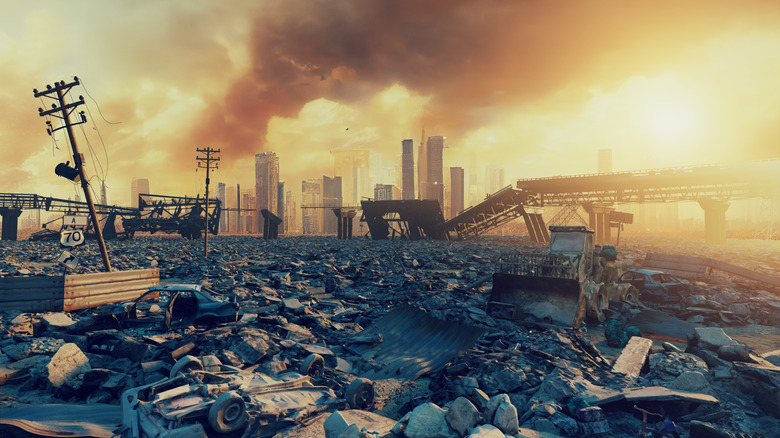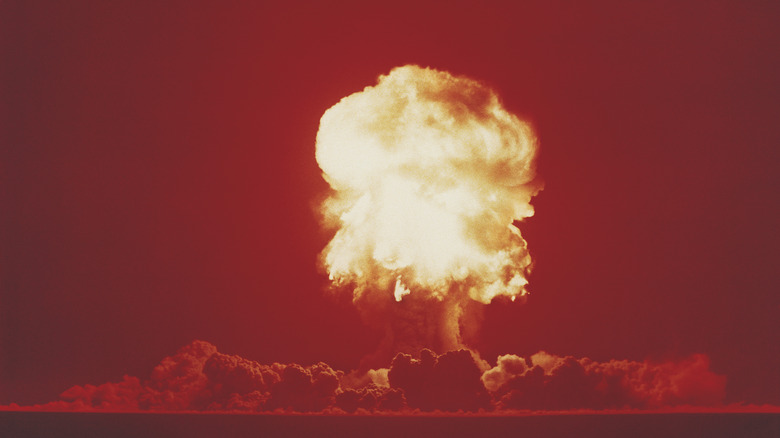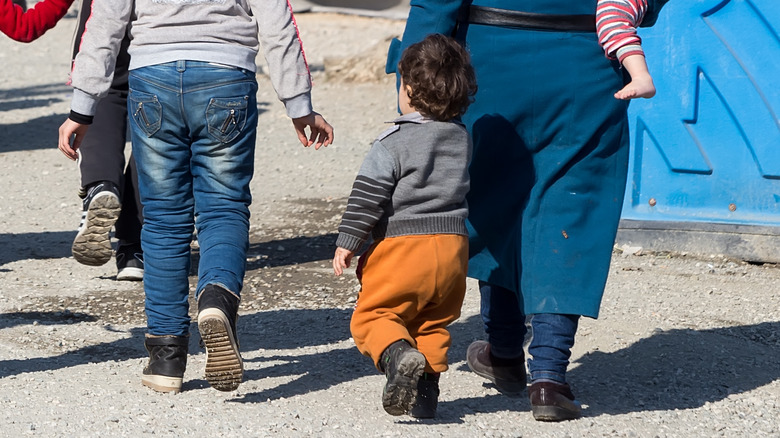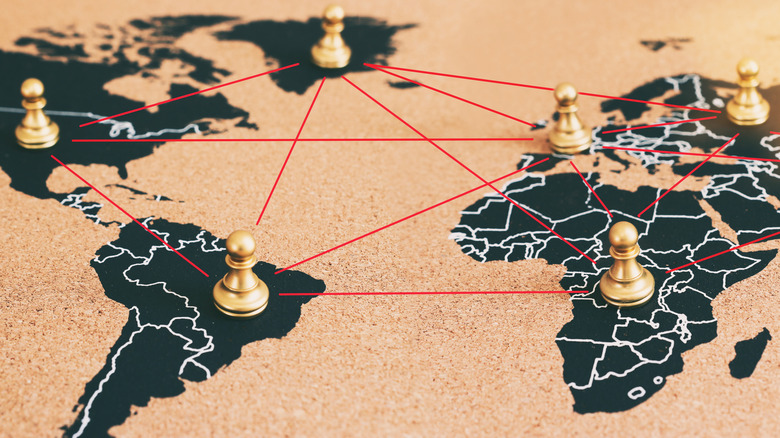Here's What Could Happen If World War III Starts
World War III: the ending to the trilogy that we're all not-too-secretly waiting for. Will it come from the sky in nuclear explosions of fire? Will it be swarms of alien hordes with pew-pew lasers and flying saucers and an inspirational speech from Bill Pullman? Will it be disembodied AI drowning the world in incendiary disinformation? Or maybe plain old environmental destruction and lessons about the insatiability of human greed? No matter the cause, it makes sense that if humanity is going to end, it'll happen via our most ancient mainstay: war.
Of course, if World War III ever breaks out, the causes would be way more complicated than "aliens here and aliens bad." All we have to do is look to the middle installment of the trilogy — World War II — to trace a convoluted thread from late 19th-century European nation-states to why World War I broke out, to Germany's role in it and their humiliation at the Treaty of Versailles in 1919, to the establishment of the Weimar Republic, the Great Depression, the rise of the Nazi party ... You see what we're getting at here?
But at least we can agree: If World War III broke out, it would likely be humanity's curtain call. Our interdependent world of trade and food webs, reliance on digital information, current and future weapons of destruction, mass human migrations, health and disease challenges ... Any war but an extremely localized war would be utterly catastrophic.
An incomprehensible arms race
"I do not know with what weapons World War III will be fought, but World War IV will be fought with sticks and stones." While that quote might have been erroneously attributed to Albert Einstein, the reasoning rings true. Imagine an ancient war: What weapons did people use? Spears? Bows and arrows? Even the most well-trained and brutal army could only kill so many people with such weapons. And now? A single guy who's reasonably good at video games can kill thousands with a drone while sitting in a room with some Funyuns and a Sprite at hand.
This brings us to the first point in our article, and the first point mentioned in the quote above: weaponry. We've already got nuclear weapons, and they're more than enough to all but permanently obliterate Earth. But wars always precipitate arms races. If World War III started, we'd have all of our current weaponry as the baseline from which to start — start, mind you — plus however things develop from the beginning of the conflict. That is unless the conflict just annihilates everyone in an overnight flash too brief to even record.
On top of current weaponry, we've got hypersonic missiles that travel many times faster than the speed of sound, AI-controlled drones and battle strikes, and more. All such weaponry would be brought to bear on population centers, obliterating communications and travel infrastructure, commercial and residential centers, while nuclear strikes plus radiation fallout would render such locations untouchable for generations.
The world economy in ruins
So we all remember the subprime loan economic crisis of 2008, right? Some greedy fiends made a boatload of money off of high-risk home loans, and markets across the globe went haywire. More recently, when Russia invaded Ukraine in 2022 energy prices across Europe skyrocketed, and global trade patterns for natural gas and oil had to be rerouted and rewritten. In other words: No patch of ground on Earth is truly isolated at this point. We're all fully interconnected and interdependent in a globalized world of trade and economy, and we thrive and perish on the strength of our fellows — at least to a large degree.
Bearing this in mind, what consequences would a truly global, world war reap on global economies and trade? Perhaps we should say "economies," because we might be using seashells as currency to buy rat meat at that point. There are obvious repercussions like broken supply chains or resources in certain parts of the world simply vanishing: food, human labor, material goods, you name it. Scarcity drives up prices, so expect whatever's left to cost an arm and a leg. This includes essential services like electricity, heating, and so forth — if they even exist.
Then there are less obvious consequences, like remaining investors becoming incredibly risk-averse. Reserve currency values would lose all meaning, and governments would overhaul economic policies. If sanctions get imposed on offending nations — if such decisions grant leverage at that point — then that would cause further economic ripples and overall devastation across the board.
Mass migration across the globe
In the case of a global conflict where the lives of millions are at risk, including you and your own family, any notion you have of an orderly, regulated mass migration of people across borders will 100% get tossed out of the window. Even legal migration causes untold difficulties when thinking of housing, job markets, sociocultural integration, etc., like in the United Kingdom where 1.2 million migrants emigrated to the commonwealth in 2023, per the U.K. Parliament. In the 2023 fiscal year, the United States saw 2.5 million try and enter the country illegally via the Mexican border, per the Wilson Center. So what would happen during World War III when havoc reigns, border enforcement measures are weakened, and nations have basic survival on the mind?
This is a good time to point out that all of the problems listed in this article are interconnected. Imagine a worst-case scenario starting with millions fleeing from a war zone in terror. Military, government, and infrastructure are in disarray on all sides. People are starving along the journey to a country whose economy and trade are crippled, where food riots have broken out and escalated the damage of war. No one has anything to spare, everyone's looking out for themselves, and AI-controlled drones streak across the sky auto-deciding what targets present threats. And if refugees make it to where they're trying to get, who's to say they won't be shot on sight? Or taken and tossed in camps without any due process at all?
Fractured trust between people and nations.
So now that we're getting a whole picture of how absolutely catastrophic World War III would be, let's go one step further by saying that people are generally ... nice enough? Provided they've got everything they want and need. Some people turn vicious if Whole Foods doesn't have their favorite brand of almonds or whatever. Others are thankfully more resilient. But when push comes to shove, folks are going to obey their biological imperatives and take care of themselves and their immediate relatives. And at a macrocosmic, national level, the same ethos applies.
World War III would see the severing of old international ties, the forging of new ones, the fall of old powers, the rise of new ones, and everything in between. In the midst of resource scarcity, shattered supply trains, demolished infrastructure, ravaged land battered by advanced weaponry, refugee crises, and much more, nations would grow distrustful of any but their most stalwart allies. International coalitions could emerge that lay the foundation for future, global power dynamics. Organizations like the United Nations or World Health Organization could be rendered all but useless. From this environment new institutions could rise, with new, possibly dictatorial madmen at their heads. And because it stands to reason that the most developed countries would get struck hardest in combat, or at least targeted above others — unless a conflict is smaller-scale and regional in nature — we could expect many of the world's current political leaders to shrivel in power.
An unparalleled humanitarian crisis
We've only scratched the surface of the most general and clear-cut consequences of World War III in this article. But when deploying technical terms like "supply chains," or describing real, living people using words like "migrants," it's critical to remember that World War III's tangled web of cause and effect boils down to one, terrible outcome: greatly increased human suffering. It might seem obvious, but that's really what we're talking about. It could never be worth it to throw out the relative ease and comfort of modernity for some selfish purpose that ruins the lives of everyone.
But if we've got to slap a technical term on things, we could cite "humanitarian crisis" as the worst, ultimate consequence of World War III. Starvation in the streets, no running water, violence for the smallest scrap of food: Those things are evident. But, place those problems aside a destroyed healthcare system and they get much, much worse. We're talking hospital triage units that leave your broken leg untended in lieu of a bullet-ridden victim, medical supplies — even essential things like insulin — drying up to nothing, and communicable diseases running rampant because displaced peoples have no homes and are all crowded together in unsanitary situations. And that's in fully developed nations. What about poorer places of the world that already suffer from similar conditions? You could argue that they might be impacted less than other places, but overall, we'd still be looking at a substantial worldwide collapse in fundamental quality of life.





